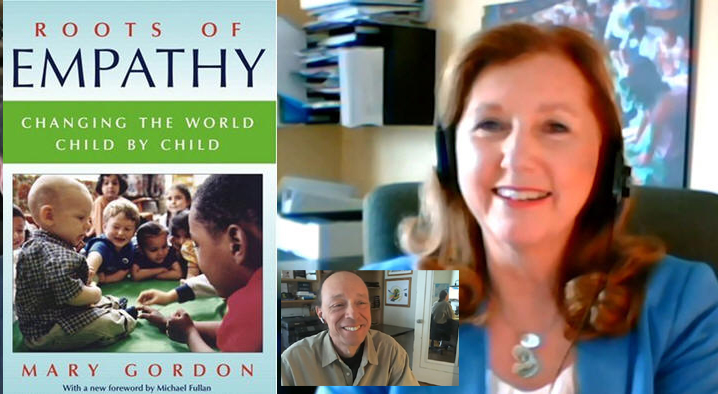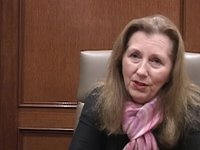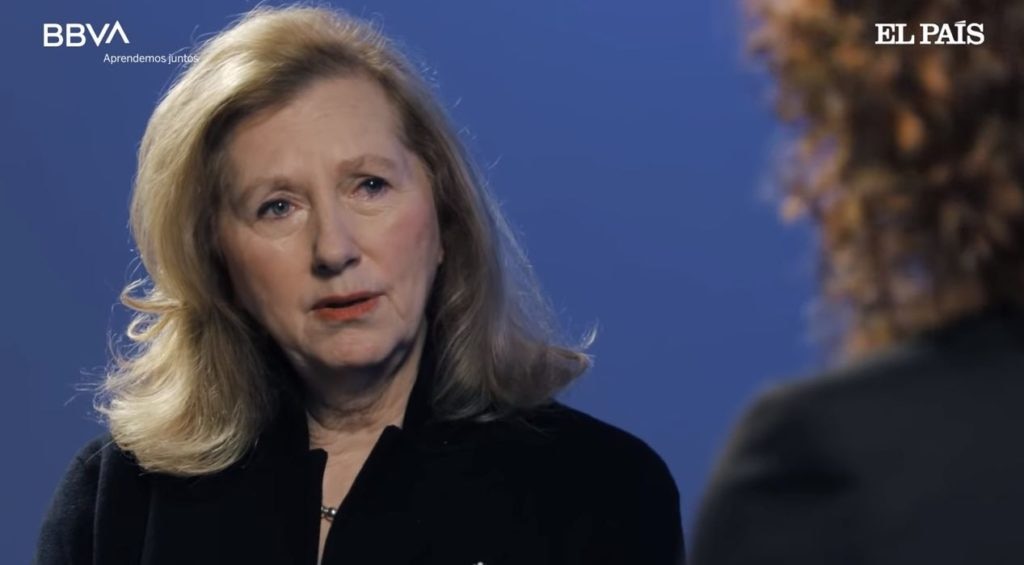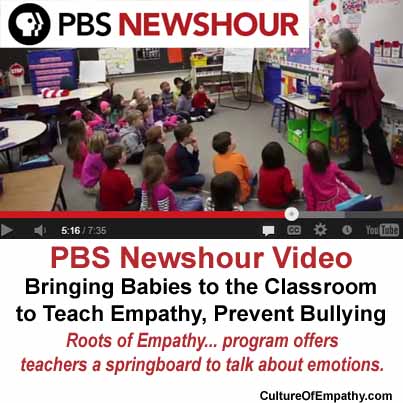|
|
|
Culture of Empathy Builder: Mary Gordon
Links
Mary Gordon founder of 'Roots of Empathy' talks about the Importance of Empathy
Mary Gordon Interview
Podcast: Empathy: Your children learn from what they see in you
Mary Gordon is
an educator and the founder of ‘Roots
of Empathy’ and ‘Seeds of Empathy’,
two revolutionary educational programs based on the development of
empathy and in nurturing emotional literacy from early childhood.
According to Mary
Gordon,
“many of the problems afflicting society, like violence and poverty, are
rooted in a lack of empathy.”
The Decade of
Empathy (Mary Gordon)
By Emma Brow "The program, called Roots of Empathy, was conceived nearly two decades ago in Toronto and has since become common across Canada. Now it has been imported to the United States, amid growing concern about classroom bullying and growing conviction that teaching certain character traits — such as persistence, self-control and self-confidence — is just as crucial for students’ futures as teaching academics."
[KDI] Mary Gordon
- Panel Discussion: Session 6 "Closing Discussion - 2010
[KDI] Mary Gordon "정감의 뿌리(Roots of Empathy)"
Love, Hate & Everything In Between: A film on empathy -- chapter 2/13
|
|||||||||||||||||||||||||
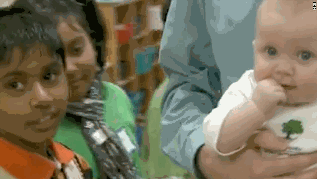 |
Your Voice: The
Importance of Teaching Kids Empathy
We talk to experts to find out how to develop this crucial trait in
children.
Empathy - our ability to feel and understand other's behaviors and care about them
Some education experts say that empathy may be more important in the classroom than reading, writing and arithmetic.
It promotes good behavior, problem solving, and reduces bullying
How can we promote empathy?
Can it be learned?
Is it ever to late to learn empathy?
Guests
Mary Gordon: Roots of Empathy
Stan Baker: Educator and Restorative Practices.
(01:25) What is empathy?
Putting yourself in the shoes of others.
there's an empathy deficit and cause of many problems
(01:50) How would you describe empathy?
how other person feels and care about them
How different from sympathy?
is more narrow and feeling sorry for, not as deep as empathy
(02:15) Stan I how do you see it in the school?
It is walking in the shoes
also, listening to someone, and reciprocal listening
Some examples?
a class with bullying - was negative class energy
used circles -
students stepped up to bullying
(04:10) - Are children naturally empathic?
They are born with the capacity - fostered
Sometimes it's socialized away
adversity
if aren't encouraged to think of others
if no examples of empathy to them
What is value of empathy?
it's core human trait
without empathy can't have meaningful relationships - friendship
understand the other
friends help
puts break on aggression
first stage of conflict resolution - take perspective of the other
(06:15) - Questions about empathy from parents
Parents worry when kinds do mean things?
need to help children understand the effect
from me to us centered
talk to child
find ways to fix things to make it right
(08:10) What if the schools is like that? (bullying)
story of bulling and running shoes - friend stood up and wore shoes
need to learn empathy when not stressed
(10:15) Describe Roots of Empathy
kindergarten to grade 8
witnessing attachment relationship
relationship is most powerful manifestation of empathy
witnessing and discussion
baby is a leaver - entry point
reflection, agents of change
emotional literacy - labeling emotions
sharing with classmates - there's an epidemic of loneliness.
(11:45) Tell an amazing Story?
older child failed class
mother was murdered
foster care
held baby - do you think if no one loved you, you could be a good father
(14:00) Restorative Practices? how does it work?
a continuum and process
how has it affected you?
conflict, taking turns to talk
non judgmental
whose been affected and in what way?
how to make it right?
(18:00) Results?
less suspensions
it's about adults too
(18:50) Parent: I don't think empathy can be taught in school, it's from parents, firm tone, loving.
what is role of parent
empathy is born at home
can not be taught but caught
you have to experience it.
we brought the home to the classroom
(20:25) What if parents are not empathic people?
Do be judgment
Breaking negative cycles
Common denominator of problems is lack of empathy
they can develop empathy by seeing it modeled
like truth and reconciliation of Tutu
(21:30) Empathy more important than 3r, how does it effect academic?
A safe learning environment
learning takes place in context of strong relationship
studies show: social and emotional understanding at grade 3 is better indicator of grade 8 mathematical success. understanding to work collaborative
Empathy is core of all prosocial behavior
(23:30) Stan:
use circle processes - turn taking in conversation
-
in North America conversations are competitions for air time
-
I'm not listening to you I'm wait for my chance to speak
-
need to slow it down
-
what do you think about this and how does it effect you and others?
-
(26:00) Is it ever to late?
-
never
-
a teaching opportunity -learn thought loving relationships
-
perspective taking
-
sharing your own feeling gives emotional literacy
-
-
Video of children in conflict and having empathy
-
take care of yourself and others
-
not the telling but the showing that has impact
-
learning empathy by osmosis - it's not taught it's caught
-
see it empathy
-
what is empathy?
-
understanding how others feel
-
-
need opportunities to take perspective of others
-
basic human trait for: relationships, friendships,
-
it's mood matching
-
do you have to much empathy?
-
healthy emotional development
-
can also enjoy the positive emotions
-
can put emotions into perspective
-
-
How do you develop it?
-
role of coach
-
show how your thinking
-
-
The more words you use to show how your feeling
-
more words to can have to explain yourself
-
-
What's importance of empathy growing up?
-
need empathy to effective parenting
-
make and keep friends
-
can advance in workplace
-
can build a team
-
better academic success
-
criminal behavior
-
a break against aggression
-
for sustainable peace
-
'Roots of Empathy' program helps reduce bullying K5HD
(Short news program about Roots of Empathy. Says a long term study shows
the program has positive social effects over the long-term.)
2010-11-30 -
Empathy initiative aims to double programmes
The classroom-based Roots of Empathy programme,
founded by internationally-recognised educator Mary Gordon and involving
classroom visits from a mother and her baby showing young children about caring
for and nurturing infants, has been running for a year in Rotorua.
2010-06-10 -
100+
Roots of Empathy babies and their parents celebrated
"Roots of Empathy is about supporting children and nurturing kindness. Our
students are privileged to take part in such a wonderful program. The Ministry
of Education is proud to support an initiative that fosters emotional literacy -
creating more welcoming and caring classroom environments." Nearly 3,350
children in Toronto and 18,000 in Ontario
participated in the program in 2009-10 with the support of the Government of
Ontario.
2010-05-24 -
Maia Szalavitz -
Kindness 101
When kids are able to watch an interaction that's empathic, empathy isn't just
being taught; it's being demonstrated," says Dr. Daniel Siegel, a clinical
professor of psychiatry at UCLA. ROE is unique, he notes, because it "combines
the direct observation of babies and their mothers, weekly time devoted to
talking about the internal world of mind and watching a baby grow up over time."
Among the program's many big-name fans: the Dalai Lama, who has twice appeared
publicly with Gordon and thinks ROE can help spur world peace.
Although human nature has historically been seen
as fundamentally selfish, social neuroscience suggests otherwise. Researchers
are finding that empathy is innate in most humans, as well as in some other
species. Chimps, for instance, will protest unfair treatment of others, refusing
to accept a treat they have rightfully earned if another chimp doing the same
work fails to get the same reward.
2009-11-24-
Amanda
Jeffery - Planting the seeds
The Early Childhood Development Centre is helping children express their
feelings at a younger age thanks to a program called Seeds of Empathy.
Like Roots of Empathy, a program already offered
in several schools in the Drayton Valley area, Seeds of Empathy brings babies
into the classroom to interact with the children. Through this interaction the
children learn how to empathize with others.
2009-09-13 - Article -
Mary Gordon wants to change humanity by rewiring a child's brain — one
child at a time. A noble idea, but is it possible? Whether she is speaking on a
panel with the Dali Lama or to students at Harvard University's John F. Kennedy
School of Government, Gordon's theme is the same: the world will be a better
place if children grow up understanding the other's perspective. There will be
no more genocides, no more wars, no more racism or violence, she declares. She
has built what she believes is a road map to achieve a kinder, gentler humanity.
But it wasn't until she came up with her Roots of Empathy program, an offshoot
of her parenting and literacy work, that she began to see how a simple idea
could transform the world. Her book, Roots of Empathy: Changing the World Child
by Child, has just been published in the United States, following publication
here four years ago. It was a Canadian bestseller, winning praise from the likes
of Fraser Mustard and Michael Fullan of the Ontario Institute for Studies in
Education. Since then she has won the endorsement of the Dali Lama, who has
embraced her program as a way to build world peace. Gordon spoke on a panel with
the Dali Lama in both Vancouver and Seattle in 2006 and 2008.
Teaching kids to care about others: Experts are divided as to whether empathy is
innate, learned or both
Chris Zdeb, Edmonton Journal
The Roots of Empathy, a national and international
organization whose mission is to build caring, peaceful and civil societies
through development of empathy in children and adults, uses babies in classrooms
to achieve its goal. A parent and baby visit once every three or four weeks
through the baby's first year. Carolyn Parkes, provincial manager for Seeds of Empathy in
Alberta, a program aimed at children in preschools and day cares, says the
program uses babies "as a lever for discussions about social and emotional
concepts."
2009-12-22 - Article - Video - Learning for Life:
Teaching your child empathy towards others
Linda Filley-Bentler from the Roots of Empathy program explains
how teaching your children how to feel compassion will help their emotional
development.
|
|
|
|
2009-05-29 - Babies
teaching empathy
The youngest teachers in Western Washington are being honored for teaching empathy by "cooing and crawling." KING 5's Mimi Jung has a look at the "Roots of Empathy" program.
|
|
|
|
2010-01-09 - Article -
Roots
of Empathy founder will speak in Langley
The woman who created one of the most successful programs to encourage children
to understand and demonstrate empathy will be the guest speaker at Seeds of
Success later this month. Mary Gorton, an internationally recognized educator,
advocate for children and expert on parenting, is the founder of Roots of
Empathy and Seeds of Empathy, two groundbreaking programs which help in
children’s development.
2010-02-18 -
Mary Gordon -
Empathic Civilization': Building A New World One Child At A Time
We are building our world on a social fault line where we have
failed to realize the greatest minds alone will not solve social problems. We
also need great hearts at the table. "The Empathic Civilization" shines light on
evidence from neuroscience that shows human nature is empathic. The basis for
solving all of the problems we face is empathy. If homo empathicus can
get that right, we allow for the viability of our physical and social universe.
And yet our ecosystems are withering on the vine without empathic input from a globalized, interconnected, citizenry. We may be on the verge of the Age of Empathy, but we still have a long journey ahead. In fact, I would argue that we are in still in our infancy, and that we live in an emotionally illiterate North America.
Other videos to sort:
International Literacy Day at the United Nations on 8 Sept 2010 Mary Gordon
Roots of Empathy
Dawson @ Roots of Empathy - Kisses for Baby Clarke
Roots of Empathy Visit # 5.MPG
First Local May
7.2010
SES08 - Breakthrough Social Entrepreneurs Look to the Future
-
At 26:45 Mary Gordon, Roots of Empathy
-
emotional literacy and Roots of Empathy
-
why does it work?
-
what do we learn
-
what can we generalize
-
-
An evidence based school program
-
raises social and empathy competence
-
raises level of empathy
-
-
Students watch the babies development
-
in Canada, USA, New Zealand
-
capacity issues
-
research base
-
-
29:00 Mary started out as a school teacher
-
learned life is not fair
-
list of problems
-
common denominator of problems is the lack of empathy
-
universal program to observe the attachment process with baby and mother.
-
-
31:50 empathy is something your born with but withers on the vine if life is vicious
-
to observe loving relationship
-
working with many people in community
-
teachers, parents, governments, etc,
-
funding
-
keep score
-
-
33:40 Research and evaluation
-
35:00 video of Roots of Empathy
-
37:30 children developing a literacy of their feelings from observing the babies feelings
-
observation and reflecting
-
bridge to empathy is understand how the other feels
-
emotional literacy is neglected in the schools
-
-
39:00 what are the teachers learning
-
we don't praise - it's a positive judgment
-
respect and inclusion - all children speak
-
children find their voice
-
-
42:00 education is not big risk takers
-
43:55 - empathy is core to
-
Altruism,
-
first step to conflict resolution - taking perspective of the other
-
The core is empathy
-
come together by understanding the feelings
-
the children are up for it
-
-
-
46:30 Roots of Empathy is bringing the community into the school


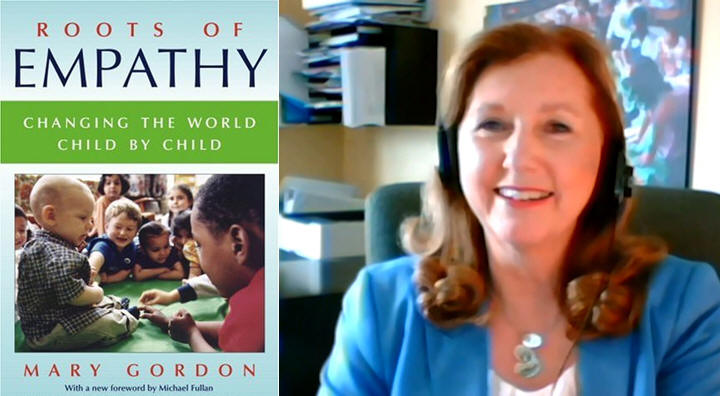
|
||||






